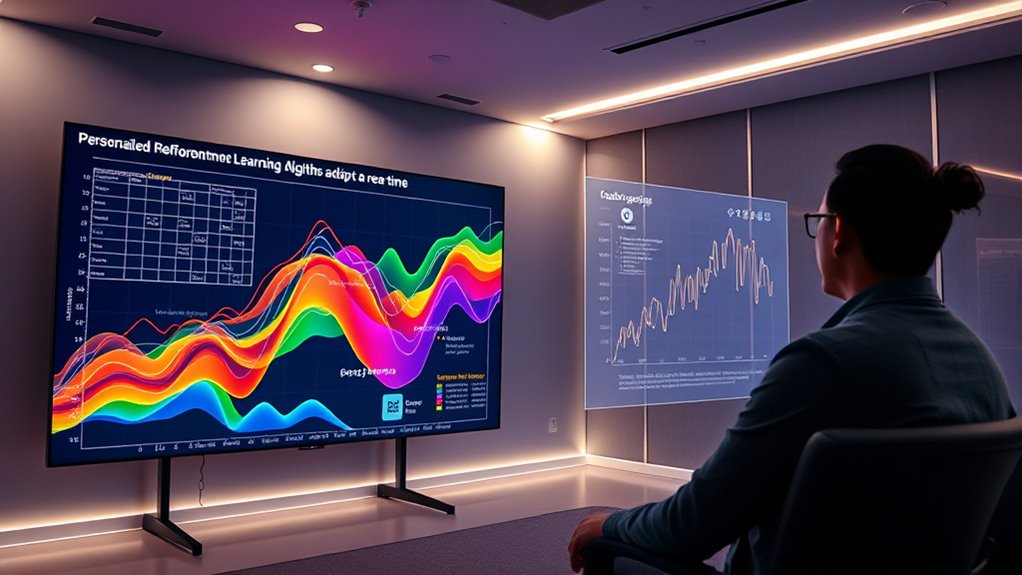Reinforcement learning shapes your personalized coaching journey by constantly analyzing your responses and progress in real-time. It adapts feedback and challenges based on your evolving skills, ensuring each step remains relevant and motivating. This approach helps you stay engaged, overcome setbacks, and develop habits aligned with your goals. As your abilities grow, the system introduces new elements tailored just for you. Keep exploring to discover how this technology keeps your path uniquely effective.
Key Takeaways
- Reinforcement learning provides immediate, personalized feedback to guide user behavior effectively.
- It dynamically adjusts coaching strategies based on individual responses and progress.
- Reinforcement signals reinforce positive habits and motivate continued engagement.
- It identifies patterns to tailor future challenges and introduce advanced or simplified tasks accordingly.
- Data-driven insights enable the creation of evolving, highly personalized coaching pathways over time.

Reinforcement learning is transforming coaching by enabling systems to adapt and improve through real-time feedback. When you engage with a coaching system powered by reinforcement learning, it continuously analyzes your responses and progress, adjusting its approach on the fly. This dynamic process allows for highly personalized coaching paths that evolve based on your unique needs and performance. Instead of following a rigid program, you receive adaptive feedback that targets your specific challenges, helping you stay focused and motivated. This tailored approach ensures that every session feels relevant and impactful, boosting your engagement and commitment.
One of the key benefits of reinforcement learning in coaching is its ability to enhance motivation. By providing immediate, context-aware feedback, the system keeps you aware of your progress and areas for improvement. When you see tangible results or receive positive reinforcement, your motivation increases, encouraging you to stick with your goals. Conversely, if you encounter setbacks, the system adjusts its guidance, offering encouragement and strategies to overcome obstacles. This constant cycle of feedback and adjustment helps sustain your motivation over time, making it easier to develop consistent habits and achieve long-term success.
The adaptive feedback mechanism is at the core of personalized coaching paths. As you work through tasks or exercises, the reinforcement learning system evaluates your performance, identifying patterns and tailoring subsequent challenges accordingly. For example, if you excel at a certain type of activity, the system introduces more advanced elements to push you further. If you struggle, it simplifies or modifies tasks to build your confidence and skill gradually. This responsiveness ensures that your coaching experience remains aligned with your current abilities, preventing frustration or boredom.
Furthermore, reinforcement learning allows coaching systems to learn from a vast array of data, including your past interactions and outcomes. This accumulation of insights enables the system to predict what strategies or feedback will be most effective for you in specific situations. As a result, your coaching path becomes increasingly personalized over time, adapting not only to your immediate needs but also to your evolving goals and preferences. Additionally, integrating principles from the Law of Attraction can enhance the positivity and mindset focus within your coaching journey.
In essence, reinforcement learning creates a responsive, motivating environment that adapts to your progress, keeping you engaged and committed. It transforms coaching from a generic program into a tailored journey that recognizes your strengths and addresses your weaknesses in real-time. With adaptive feedback driving motivation enhancement, you’re more likely to stay on track, overcome challenges, and ultimately reach your full potential.
Frequently Asked Questions
How Does Reinforcement Learning Adapt to Changing Client Goals?
Reinforcement learning adapts to changing client goals by employing adaptive strategies that update based on new feedback. It monitors your progress and adjusts coaching paths to maintain goal flexibility, ensuring the approach remains aligned with your evolving needs. This dynamic process allows the system to learn from your actions, refine strategies, and provide personalized guidance that evolves seamlessly as your goals shift over time.
What Are the Ethical Concerns With Ai-Driven Coaching?
You should consider ethical concerns with AI-driven coaching, like bias mitigation and transparency challenges. These systems might unintentionally reinforce biases or lack clarity about how decisions are made. As a user, you need to be aware of these issues, ensuring the coaching remains fair and trustworthy. Developers must prioritize transparency and bias mitigation efforts to foster ethical AI practices, helping you feel confident in the personalized guidance you receive.
Can Reinforcement Learning Improve Coaching for Diverse Learning Styles?
Imagine your coaching journey as a river, flowing uniquely for every learner. Reinforcement learning acts like a skilled guide, offering adaptive feedback that navigates different learning styles smoothly. It helps tailor skill customization, ensuring each person’s path aligns with their strengths. By continuously adjusting to your progress, reinforcement learning creates a personalized coaching experience that grows with you, making learning more engaging and effective for diverse learners.
How Do Data Privacy Issues Impact Personalized Coaching?
Data privacy issues critically impact personalized coaching by emphasizing data security and consent management. You need to guarantee that sensitive information is protected through robust data security measures, preventing breaches. Additionally, clear consent management allows you to respect user privacy, giving individuals control over their data. Balancing personalized insights with these privacy protocols is vital, so your coaching remains effective while safeguarding user trust and complying with regulations.
What Are the Limitations of Reinforcement Learning in Coaching Applications?
Reinforcement learning in coaching has limitations you should consider. It can suffer from algorithm bias, leading to unfair or ineffective recommendations. Additionally, the models often lack interpretability, making it hard for you to understand why certain coaching paths are chosen. These issues can affect trust and personalization, so you need to be cautious and make certain proper oversight when implementing reinforcement learning in coaching applications.
Conclusion
By harnessing reinforcement learning, you become the captain of your own coaching journey, steering through personalized paths tailored just for you. It’s like having a wise guide whispering, “You’re capable of more,” with every step you take. This technology transforms your growth into an adventure—dynamic, exciting, and uniquely yours. So, embrace these smart coaching paths, and watch how your potential unfolds like a story written just for you, chapter after chapter.









